Experts have reveal the warning signs everyone should know to look for in their mouth that can give you an insight into your health.
From wobbly teeth to persistent ulcers to serious and even life-threatening illnesses, they can be indicated by the way your teeth, gums and tongue look and feel.
Two dentists, Dr Hanna Kinsella of Kiln Lane Dental in St Helens and Dr Kamila Azimova in Ascot, have outlined the subtle changes and symptoms that could be the sign of something more serious.
A red tongue could mean you have anaemia and the growth on the gum could mean you’re pregnant.
Dental patients in England missed over 19 million appointments in 2020 as lockdown triggered what has been hailed as a ‘ticking time bomb’ for the nation’s oral health.
What’s more, over eighteen months of mask restrictions means that as a nation we’ve been relying on our eyes to smile when out in public. Now though, with restrictions on masks easing in many places, our teeth are back on display once again, so here’s the hidden health warnings that could be lingering in your mouth.
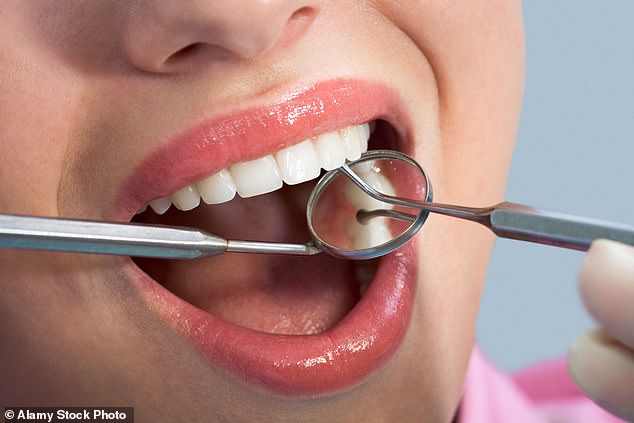
Two dentists in the UK have outlined what to look for in your mouth that could be sign of something serious – including a red growth on the gum could be a sign of pregnancy (file image)
Bleeding gums
Could mean: Hormone imbalance
‘Swollen or bleeding gums, that usually bleed when brushing, could be a sign of gingivitis,’ explained cosmetic dentist, Dr Hanna Kinsella.
‘This could mean that your hormone levels are not balanced. Hormone changes or imbalances that occur at different stages of our lives can put some women at risk of gingivitis which is a gum infection.
‘It can occur if the natural hormone levels are changed, for example during pregnancy, when it’s most likely to occur during the second trimester, or at other times such as during menopause.
‘If untreated this can lead to periodontal disease which is an infection of the gums ligament and bone, and in severe cases tooth loss.’
A round red growth on the gum
Could mean: Pregnancy
‘Pregnancy epulis or pyogenic granuloma is a round red growth that appears on the gum that can bleed easily,’ explains Dr Kinsella.
‘Like most gum problems during pregnancy it’s caused by hormone changes and usually resolves after birth, but it’s still important to get it checked because for a small number of women it can develop into more severe gum disease.’
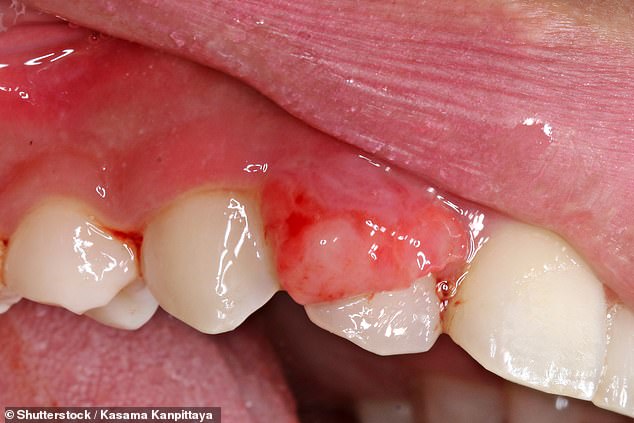
A pyogenic granuloma is a round red growth that appears on the gum that can bleed easily, and is common during pregnancy, but should be checked out to ensure it doesn’t develop into more severe gum disease (stock image)
Flat teeth
Could mean: Stress
‘Stress impacts our entire body, even our teeth,’ explains Dr Kinsella. ‘Tooth grinding is often related to stress and anxiety and manifests itself with worn down, or flat teeth.
‘A lot of people who grind their teeth aren’t even aware they’re doing it because it happens at night while they’re sleeping or when they’re concentrating.
‘Flat teeth are also associated with headaches and jaw pain. Your dentist can make you a mouthguard to help reduce this or help to repair the damage that it has caused. Botox injections can help to reduce teeth grinding as well.’

Teeth grinding and flat teeth are caused by stress. Because it happens at night, a lot of people aren’t aware they are grinding their teeth (stock image)
White patches
Could mean: HIV or cancer
‘White patches in the mouth, or Leukoplakia, are usually harmless and can be caused from smoking or other irritations or even oral thrush,’ explained Dr Kinsella.
‘However on very rare occasions white patches in the mouth can be a sign of HIV or cancer. Your dentist will examine the patch to rule out fungal infections and check it hasn’t been caused by biting. They may refer you to a specialist for a biopsy,’ she added.
;If you do have leukoplakia there’s a small risk it can progress to mouth cancer over time. Treatment for Leukoplakia isn’t always necessary but stopping smoking and reducing alcohol can help to reduce it.’
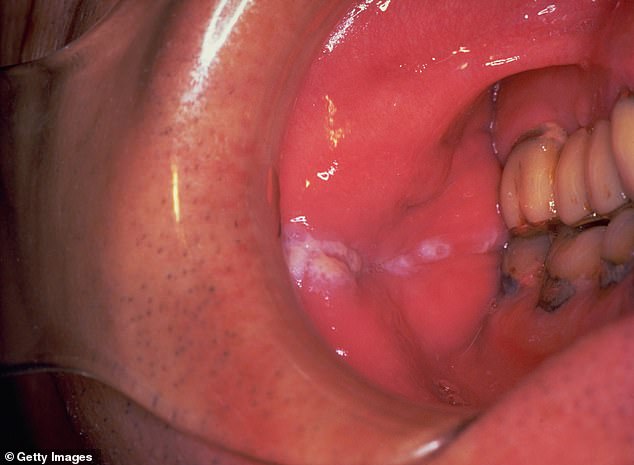
White patches on the gums, or Leukoplakia, are usually benign but can also, in the rarest cases, be a sign of cancer of HIV (stock picture)
Sensitive teeth
Could mean: Repeated vomiting
‘Repeated vomiting, for instance as with patients with bulimia or hyperemesis throughout pregnancy, can cover teeth with strong stomach acids which over a prolonged period of time can damage the tooth enamel and make them sensitive because the nerve endings in the underlying layers become exposed, and more prone to decay,’ explains Dr Kinsella.
‘It’s also best to avoid brushing teeth immediately after vomiting because this may scratch the tooth enamel. Rinse your mouth with water and then with a fluoride mouthwash.’
Persistent ulcer
Could mean: Mouth Cancer
‘Mouth cancer, or oral cancer, occurs when a tumour develops in the mouth, including the lips, tongue, gums and tonsils,’ explains Cosmetic Dentist, Dr Kamila Azimova.
‘The symptoms of mouth cancer include painful persistent mouth ulcers, lumps that don’t go away and unexplained tooth looseness or numbness. Sometimes it can manifest in red or white patches in the lining of the mouth and tongue.
‘Often these are picked up by the dentist during routine appointments and so this lack of routine appointments during the pandemic means that there could be a number of these cases yet undiagnosed.
For this reason it’s important to see your dentist if you spot anything unusual in your mouth because if caught early it’s usually treatable.’
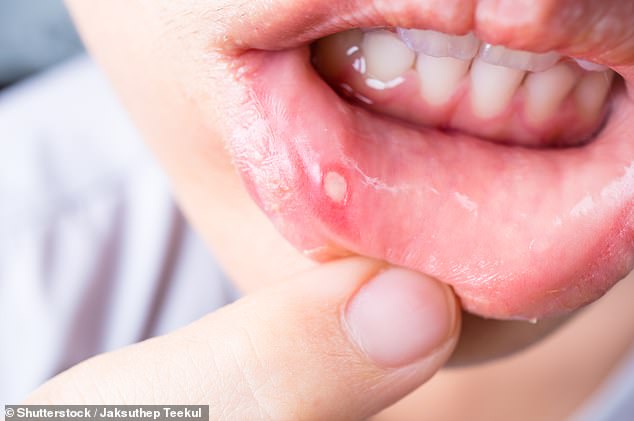
Persistent mouth ulcers, pictured, could be a sign of mouth cancer and need to be investigated (stock picture)
Red tongue
Could mean: Chronic iron deficiency
‘Glossitisor anemia tongue is a condition that causes the tongue to become red and irritated and inflamed,’ explains Dr Azimova.
‘The tongue’s look can change into different tones of red and swell in size when levels are low, it can also change in texture. The mouth can feel sore and cracks can appear at the corners of the lips too.’
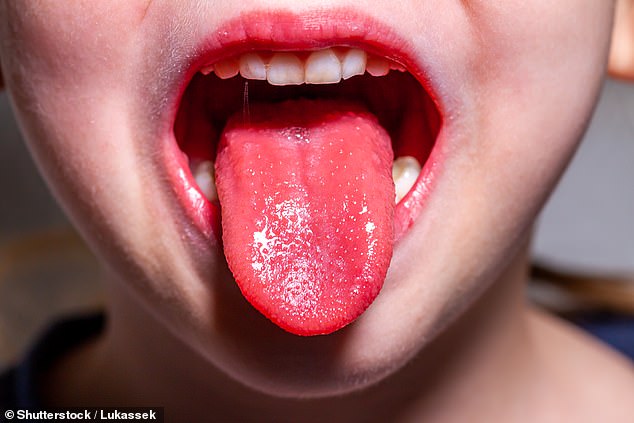
A red tongue can be the sign of an iron deficiency and is caused by a condition called Glossitisor anemia, stock picture
Gum pigmentation
Could mean: Addison’s disease
‘Gum colour varies from one person to another and pigmentation is often linked to your complexion and skin colour, a bit like freckles on the skin,’ explains Dr Azimova.
‘However pigmentation of the gums can also be a sign of Addison’s disease, which is a disorder which stops the adrenal glands from producing enough hormones and as this disease progresses.
‘Another cause of pigmentation of the gums is Peutz-Jeghers syndrome, which is a genetic condition that can increase the risk of developing polyps or cancer. One of the early symptoms is dark blue or dark brown freckles on the mouth, fingers and toes.’
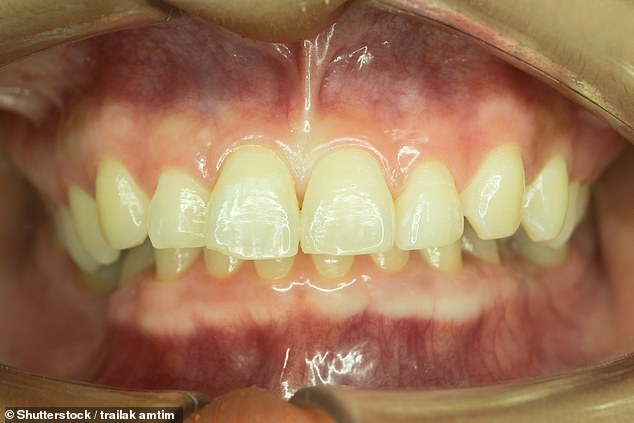
Gum pigmentation is linked to skin colour, however, a change in pigmentation can be a sign of Addison’s Disease, a disorder which stops the adrenal glands from producing enough hormones (stock picture)
Source link : https://www.dailymail.co.uk/femail/article-9831223/What-teeth-say-health-Experts-reveal-warning-signs-know.html











